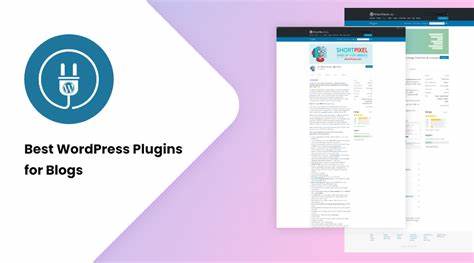Table of Contents

Introduction:
WordPress has been the preferred content management system (CMS) for millions of websites across the world, thanks to its ease of use, flexibility, and scalability. While the core WordPress software provides a strong foundation for any website, it is the plugins that make the CMS truly powerful and versatile.
Plugins are small software applications that add additional functionality and features to your WordPress website. They can help you enhance your website’s performance, design, security, and much more. In this comprehensive guide, we will explore everything you need to know about WordPress plugins and how to use them to maximize your website’s potential.

What are WordPress plugins?
A plugin is a software application that extends the core functionality of WordPress. Plugins are written in the PHP programming language and use the WordPress APIs to interact with the core software. WordPress plugins can add new features to your website, change the way existing features work, or even add entirely new functionality to your website.
Why use plugins in WordPress?
The main reason to use plugins in WordPress is to add additional functionality and features to your website. Without plugins, you would have to write custom code or hire a developer to add specific functionality to your website. With plugins, you can add new features and functionality to your website with just a few clicks.
Plugins can also help you improve your website’s performance, security, and design. For example, you can use plugins to optimize your website for search engines, add security features such as two-factor authentication, and even create custom page designs with a visual page builder.

How to choose the right WordPress plugins?
With thousands of plugins available in the WordPress plugin repository, choosing the right plugins for your website can be a daunting task. Here are some tips to help you choose the right plugins for your website:
- Determine your website’s needs: Before you start installing plugins, you need to determine the specific functionality and features that your website needs. This will help you narrow down your search and select the right plugins for your website.
- Check compatibility: Before installing a plugin, make sure it is compatible with your version of WordPress and any other plugins you are using.
- Read reviews and ratings: Reading reviews and ratings from other users can help you determine the quality and reliability of a plugin.
- Look for updates: Make sure the plugin is regularly updated and has a good track record of bug fixes and security updates.
- Consider the plugin’s impact on performance: Some plugins can slow down your website, so it’s important to choose plugins that are optimized for performance.
- Consider the cost: Some plugins are free, while others are paid. Consider the cost of the plugin and whether it is worth the investment for your website.
- Check for support and documentation: Make sure the plugin comes with good support and documentation, so you can get help if you run into any issues.
Popular categories of WordPress plugins:
- SEO plugins: These plugins help optimize your website for search engines, making it easier for search engines to understand your content and rank it higher in search results. Examples include Yoast SEO and All in One SEO Pack.
- Performance optimization plugins: These plugins help improve the speed and performance of your website, making it faster and more efficient for users. Examples include W3 Total Cache and WP Super Cache.
- Customization plugins: These plugins help you customize the appearance and functionality of your website, giving you more control over the design and layout. Examples include Elementor and Divi Builder.
- E-commerce plugins: These plugins help you add e-commerce functionality to your website, allowing you to sell products or services online. Examples include WooCommerce and Shopify.
- Contact form plugins: These plugins help you add contact forms to your website, making it easy for visitors to get in touch with you. Examples include Gravity Forms and Contact Form 7.
- Backup and recovery plugins: These plugins help you backup your website data and recover it in case of a data loss or other disaster. Examples include UpdraftPlus and BackupBuddy.
- Social media plugins: These plugins help you integrate your website with social media platforms, making it easier for visitors to share your content and connect with you on social media. Examples include Jetpack and AddThis.
- Analytics and tracking plugins: These plugins help you track your website’s traffic and analyze user behavior, giving you valuable insights into how visitors interact with your website. Examples include Google Analytics and MonsterInsights.
- Newsletter plugins: These plugins help you create and manage email newsletters, making it easy to keep in touch with your subscribers. Examples include Mailchimp and ConvertKit.
- Membership and subscription plugins: These plugins help you create membership and subscription-based websites, allowing you to restrict access to certain parts of your website based on user roles and subscription levels. Examples include MemberPress and WishList Member.
Advantage of WordPress plugins:
- Increased functionality: Plugins add a wide range of functionality to your WordPress website, including e-commerce, contact forms, social media integration, and more. With the right plugins, you can turn your website into a powerful online tool with a wide range of capabilities.
- Improved performance: Many plugins are designed to improve the performance and speed of your website, making it faster, more efficient, and easier for visitors to use. This can help improve your website’s user experience, reduce bounce rates, and increase conversions.
- Enhanced security: Many plugins offer security features to help protect your website from hacking and other security threats. For example, there are plugins that provide firewalls, spam protection, and regular backups to help keep your website secure and protected.
- Customization options: With plugins, you can customize your website in a variety of ways, including changing the layout, adding custom widgets, and modifying the appearance and behavior of your website. This gives you more control over the look and feel of your website, allowing you to create a unique, personalized online experience.
- Cost savings: Installing plugins can save you time and money by providing pre-built solutions for common website needs. Instead of hiring a developer to create custom code, you can simply install a plugin and get started right away.
- Improved search engine optimization: Many plugins are designed to help optimize your website for search engines, making it easier for search engines to understand your content and rank it higher in search results. This can help increase your website’s visibility and attract more traffic.
- Ease of use: Plugins are easy to install and use, making it simple for even non-technical users to add new functionality to their website. With a few clicks, you can add new features, customize your website, and start using it in new and exciting ways.
- Access to a large community: WordPress has a large and active community of users, developers, and experts who are always willing to help with questions and offer support. This makes it easy to get help and support when you need it, and to stay up-to-date with the latest WordPress trends and best practices.
Conclusion:
Plugins are a crucial part of any WordPress website, helping you add additional functionality and features, enhance your website’s performance, and customize its appearance and behavior. With thousands of plugins available, it can be difficult to choose the right plugins for your website. By considering your website’s needs, reading reviews and ratings, and checking compatibility and performance, you can select the plugins that will help you maximize your website’s potential.

